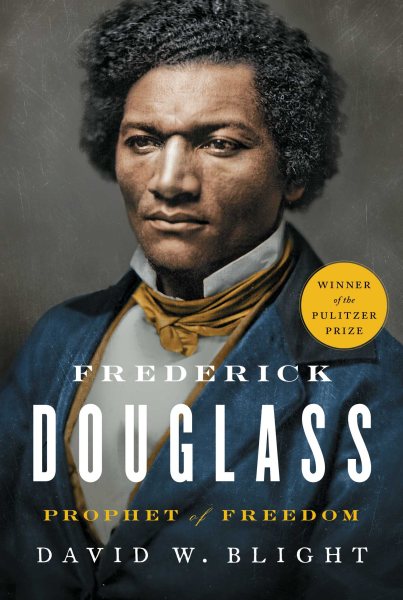I’ve read and taught Frederick Douglass’ first autobiography, The Narrative of the Life of Frederick Douglass, for years, so when I saw David Blight’s Frederick Douglass: Prophet of Peace, I was intrigued. Douglass’ Narrative covers just a sliver of his life, but it does so with intensity and purpose—namely, to help Americans in 1845 see and vicariously experience the horrors endured by enslaved people in America.
 Blight’s biography, which won the 2019 Pulitzer Prize in History, offers a similar intensity, but pulls the camera back to offer a wider-angle view. We are greeted with the larger political and social contexts through which Douglass’ life flowed, yet Blight’s writing never looses its focus on Douglass’ own experiences. Showing these intersections between national history and Douglass’ personal history allows Blight to muse on how Douglass’ writing and activism affected the American abolitionist movements, and how the various gears of those movements affected Douglass personally.
Blight’s biography, which won the 2019 Pulitzer Prize in History, offers a similar intensity, but pulls the camera back to offer a wider-angle view. We are greeted with the larger political and social contexts through which Douglass’ life flowed, yet Blight’s writing never looses its focus on Douglass’ own experiences. Showing these intersections between national history and Douglass’ personal history allows Blight to muse on how Douglass’ writing and activism affected the American abolitionist movements, and how the various gears of those movements affected Douglass personally.
The book does a fantastic job of both lionizing Douglass, with quoted, researched descriptions of his wildly popular speeches, and humanizing the man by showing us his personal struggles with family and dear friends. Especially heartbreaking is the deterioration of the friendship between Douglass and abolitionist stalwart William Lloyd Garrison. Garrison was the first major abolitionist figure to recognize Douglass’ genius. Garrison thrust Douglass to the forefront and encouraged him to use his story as a weapon against those who deemed slavery just. Both men valued each others’ opinions and held the other in high esteem. Yet ego and ambition (from both men, honestly) eroded their relationship into one of petty bitterness.
Blight’s biography does what all great biographies do: it gives insight into the character, showing complexities beyond the blurbs in history books. And while Blight’s tome is a thick one (760 pages of narration, with an additional 100 of end-notes) the detail with which he tells Douglass’ story doesn’t get bogged down in useless minutia. His writing is lively and thorough at the same time—a true rarity.


Comments are closed.